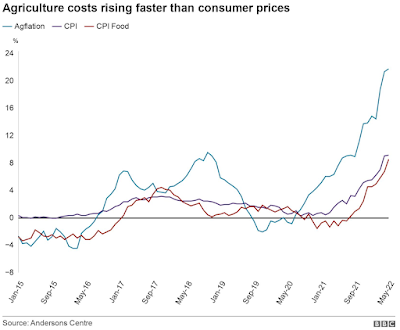You would think that farmers would be excited about grain shortages: if Russia blocks Ukraine's exports, that raises the price for other exporters. Unfortunately shortages are all over input costs: fertilizer and gas are more costly than ever, and other factors are pushing the price of pork up, as shown in this BBC news article from today (June 29, 2022).
As the above chart shows, the trend is just gathering steam: in September 2021 Bloomberg reported on low inventories of beef, pork, and chicken. I don't have an update on inventories, but it seems the pressures are still strong.


